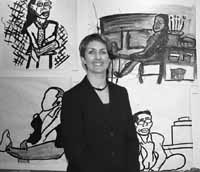Arts Education Conference at the Heritage School
At the morning plenary session Heritage School principal Peter Dillon introduced Judith Burton, professor in the program in Art and Art Education at TC who conceived of the Heritage School in 1996, and Joan Firestone, Special Advisor to the Chancellor for Arts Education. Firestone spoke of the necessity of implementing the arts as an integral part of the curriculum, not as an add-on or luxury. She pointed out that out of 80,000 public school teachers in New York City there are only 2,400 fine arts teachers. Firestone said, "We don't want to replace general education with the arts, but we want respect for the arts."
Professor Judith Burton discussed how the Heritage School integrates the arts into the curriculum. The Heritage School is a comprehensive public high school that has the arts at the core of its curriculum. All the students in the school take art, dance, music and drama along with their regular academic programs. Students also engage actively with New York City's cultural institutions with regular visits to museums, theaters, and concert halls. One of the most unique features of the Heritage School is its extended day program where students receive tutoring and can take classes in karate, painting, sports, and community internships. "The importance of the vision of the Heritage School is that not only have we tried to have a vision for the whole curriculum, but that that includes the arts as an indigenous part of the whole. If you took the arts out," Burton noted, "then it would quite literally impoverish children's learning."
After the opening plenary, participants split into breakout sessions, focusing on different aspects of running a successful arts education program. Topics included collaborations with museums what is good arts education, funding the arts, and integrating the arts in the classroom. Heritage School students also took some participants on tours of the school. One of the overall themes of the conference was that arts programs must follow good models and be held to high standards in order to fight for a place in ever tighter school budgets. Firestone said, "I think there is a will to move towards the model that Judith has created in the Heritage School. That model is really based on professional engagement with the arts. There is a strong will for the Department of Education to embrace the arts, but to embrace the arts in a manner that will be as strong academically as are the requirements in the other academic areas."
Maxine Greene, Teachers College Professor Emeritus, spoke at the afternoon plenary. Greene also sounded the themes of the day: the importance of the arts and imagination to education. She said she has been "challenging people to tap the imaginations of children, to open them to perspectives, to landscapes they could not have seen but for engagement with painting, with the other arts, which they could not have seen without the self-reflection that is occasioned by a significant art experience."
Lisa Hochtritt, Arts Education and Grants Coordinator at the Heritage School, who organized the conference, says that she hopes it will be an annual event. The conference drew together arts educators and supporters of arts in education to forge what Heritage School principal Peter Dillon called a "collective, powerful, shared voice" to advocate for the arts in schools.
Published Monday, Feb. 10, 2003
